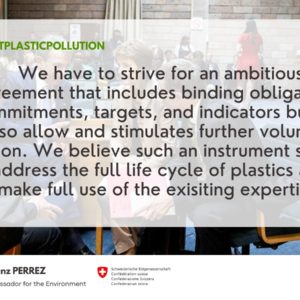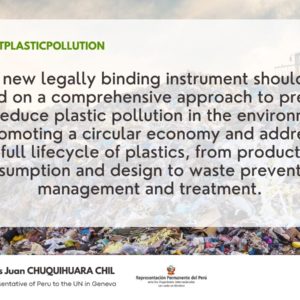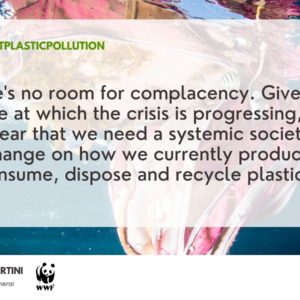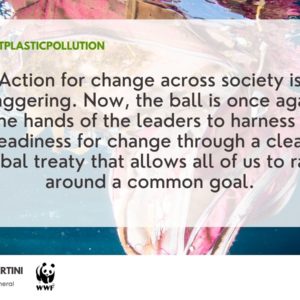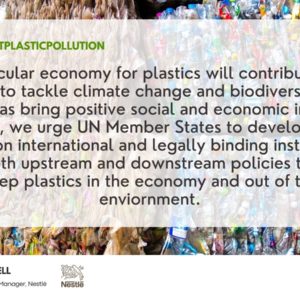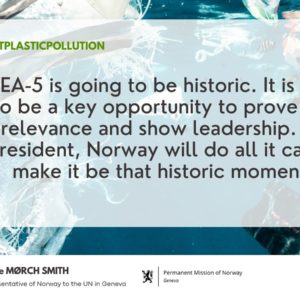Event Virtual
UNEA-5.2 High Level Dialogue on a Global Instrument on Plastic Pollution | Geneva Beat Plastic Pollution Dialogues
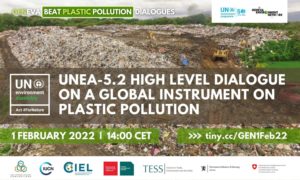
The Geneva Beat Plastic Pollution Dialogues aim to facilitate further engagement and discussion among the stakeholders in International Geneva and beyond. In addition, they intend to address the plastic crisis and support coordinated approaches that can lead to more efficient decision-making. Ahead of the second segment of the 5th UN Environment Assembly (UNEA-5.2), this briefing brought the latest updates on the negotiations for a Global Instrument on Plastic Pollution to the Geneva community.
About the Dialogues
The world is facing a plastic crisis, the status quo is not an option. Plastic pollution is a serious issue of global concern which requires an urgent and international response involving all relevant actors at different levels. Many initiatives, projects and governance responses and options have been developed to tackle this major environmental problem, but we are still unable to cope with the amount of plastic we generate. In addition, there is a lack of coordination which can better lead to a more effective and efficient response.
Various actors in Geneva are engaged in rethinking the way we manufacture, use, trade and manage plastics. The Geneva Beat Plastic Pollution Dialogues aim at outreaching and creating synergies among these actors, highlighting efforts made by intergovernmental organizations, governments, businesses, the scientific community, civil society and individuals in the hope of informing and creating synergies and coordinated actions. The dialogues highlight what the different stakeholders have achieved at all levels, present the latest research and governance options. In addition, the dialogues encourage increased engagement of the Geneva community in the run-up to various global environmental negotiations, including UNEA-5 in February 2021 and February 2022.
Building on the outcomes of the first series of dialogues and the recent policy developments, the Geneva Environment Network is hosting a second series of events to facilitate further engagement and synergies on tackling the plastic crisis. These events are held in collaboration the Basel, Rotterdam and Stockholm Conventions Secretariat, the Center for International Environmental Law, the Global Governance Centre at the Graduate Institute, IUCN, Norway, Switzerland, and the Forum on Trade, Environment & the SDGs (TESS).
About this Session
As plastic is a global issue, international cooperation is needed to coordinate actions to have an efficient decision making to tackle this major environmental problem. Solidarity and the involvement of all stakeholders must be guiding principles, as highlighted in the Ministerial Statement issued at the Ministerial Conference on Marine Litter and Plastic Pollution, convened by Germany, Ecuador, Ghana and Vietnam, in Geneva, on 1-2 September 2021.
Urgent action is needed at all levels, including setting common objectives, developing concrete targets and action plans, taking strong measures, and strengthening regional and global cooperation and decision-making, based on the latest available science. Many governments, businesses, civil society organizations, local authorities and academic institutions have thus been calling for the establishment of a global legally binding instrument to address the risks posed by plastic throughout its lifecycle.
At the end of the Ministerial Conference on Marine Litter and Plastic Pollution of September, Peru and Rwanda presented a first draft of a resolution to pave the way for an Internationally legally binding instrument on plastic pollution. This draft was intended to serve as the formal basis for the start of negotiations on a global agreement at the 5th UN Environment Assembly (UNEA-5.2) in February 2022. At the end of 2021, Japan also proposed a resolution for an International legally binding instrument on marine plastic pollution. Both resolutions call for quick negotiation in the lead-up to UNEA-6 to address this major crisis.
With only a few weeks left before this major event in the global agenda of environmental governance, this dialogue offers an overview of the preparations for the negotiations on this important matter. It is also the occasion to reflect on the outcomes of the previous sessions of the Geneva Beat Plastic Pollution Dialogues.
Speakers

H.E. Amb. Tine MØRCH SMITH
Permanent Representative of Norway to the UN and other International Organizations in Geneva (UNEA Presidency)

H.E. Amb. Luis Juan CHUQUIHUARA CHIL
Permanent Representative of Peru to the International Organizations in Geneva

H.E. Amb. Kozo HONSEI
Deputy Permanent Representative of Japan to the International Organizations in Geneva

Jodie ROUSSELL
Senior Public Affairs Manager, Nestlé
Takako TSUJISAKA and Takashi MIZUSHINA, from the Permanent Mission of the Japan to the United Nations and other International Organizations in Geneva, will join the Q&A session of this event.
Highlights
Summary
Opening and Introduction | H.E. Franz PERREZ, Switzerland Ambassador for the Environment
There is a broad consensus today that plastic pollution is an issue of global concern. While the concerns originally focused on the impact on the marine environment, it has become clear that other ecosystems are also suffering from plastic pollution. While many initiatives have been undertaken to address this major environment threat, the need for a global legally binding instrument is now clear. It is now expected that UNEA-5.2 will start a negotiation process toward such an instrument.
Regarding its substance and its process, this new instrument would have to fulfill a set of criteria. First, we have to strive for an ambitious agreement, which sets clear legally binding obligation, commitments, targets and indicators, while also allowing for further voluntary action. Therefore, it has to be both robust and flexible. Furthermore, Switzerland believes that the agreement should address the full life cycle of plastics. It should also build on and make full use of the expertise that we already have, particularly from existing mechanisms and MEAs, in order to be complementary to existing instruments and avoid duplication. Finally, compliance and monitoring will be a critical part of this instrument, including the provision of financial and technical support.
On the Road to UNEA-5.2 | H.E. Amb. Tine MØRCH SMITH, Permanent Representative of Norway to the UN and other International Organizations in Geneva
Norway holds the presidency of the 5th Environment Assembly, which will be held in Nairobi in February 2022. It is our ambition that UNEA-5 will take a decision to launch negotiations towards a global agreement on plastic pollution to guide our common actions, targeting the whole life cycle of plastic products.
Preventing and reducing plastic pollution has been on the top of Norway’s environmental agenda for a while. Since 2014, Norway has pushed for stronger global commitment to address marine plastic litter and plastic pollution, including a legally binding global agreement as the most effective solution.
At UNEA-5.2, the global community will meet to negotiate a resolution that we hope will be a strong basis for a legally binding global agreement. While we are not there yet, it is encouraging to see all the support for such a decisive step towards stronger global commitment. Over the past months, discussions on the impacts of plastic pollution and the possible solutions have been ongoing with a range of organizations and actors, including civil society and business. Two draft resolutions have been presented for the consideration of UNEA-5.2 that share the ambition of establishing an Intergovernmental Negotiating Committee for a new agreement.
There is no vaccine against plastic pollution. The challenges and the solutions are different in all corners of the world. However, commitments in a new agreement should be the same for all. As we prepare for the negotiations of a new global agreement on plastic pollution, Norway thanks the Geneva Environment Network, Switzerland and all the other partners for all your hard work to put plastic pollution at the top of the global agenda, as well as all the participants who have engaged in and contributed to these important discussions.
Let’s now build on what we have learnt and make sure that the resolution adopted at UNEA will lead to a comprehensive legally binding agreement, which will bring about change and a real impact in addressing global plastic pollution.
Resolutions Paving the Way for an International Legally Binding Instrument
Internationally Legally Binding Instrument on Plastic Pollution | H.E. Amb. Luis Juan CHUQUIHUARA CHIL, Permanent Representative of Peru to the International Organizations in Geneva
Plastic pollution is a widespread problem which affects all ecosystems and threatens wildlife, human health, food safety, and economic development. In the oceans, plastic pollution harms not only marine ecosystems and quality ocean health, but also fisheries, the health of marine species, coastal tourism, and contributes to climate change. Furthermore, it also has a direct impact on a broad range of human rights, including the rights to life, health, science, housing, and a healthy environment.
Because of the great impact that plastic pollution can cause, Peru has taken several measures to address this problem, including a roadmap for the integral management of plastic to prevent the degradation of marine ecosystems. However, one country cannot address this transboundary problem alone. Actions at the national level have to be strengthened with a coordinated global solution, involving governments, civil society, academia, the private sector, and the consumers.
Discussions in international for a are all pointing toward one direction: the need to have a global instrument on plastic pollution. For instance, members of the informal dialogue on plastic pollution and environmentally sustainable plastics trade at the World Trade Organization recently agreed on a ministerial declaration to support global efforts to reduce plastic pollution. The Ministerial Declaration adopted at the first Ministerial Conference on Marine Litter and Plastic Pollution, convened in Geneva in September 2021, reaffirmed the commitment to achieve a global agreement with ambitious goals, wide participation and means of implementation.
During the Ministerial Conference and ahead of UNEA-5, Peru and Rwanda circulated the first draft of a resolution that aims to end plastic pollution, currently cosponsored by 53 Member States. This initiative builds upon previous resolutions of the UNEA and is put forward under the firm conviction that greater international measures are needed to prevent and reduce plastic pollution in the environment, including microplastics. The main purpose of the resolution is to convene an Intergovernmental Negotiating Committee (INC) and establish an open mandate for negotiations to develop a new legally binding global instrument.
This new legally binding instrument should be based on a comprehensive approach to prevent and reduce plastic pollution in the environment, by promoting a circular economy and addressing the full lifecycle of plastics. It should include shared objectives, national action plans and commitments, tailored to local and national circumstances and the characteristics of specific sectors, scientific and technical support, as well as financial and technical assistance. It should promote multi-stakeholder engagement (scientific community, businesses and industry, the finance sector, civil society, etc) and include both legally binding and voluntary elements.
Plastic pollution cannot be solved by focusing only on marine ecosystems or downstream solutions and cannot answer only to private interests. It is a complex issue that affects biodiversity and human health, and disproportionately affects developing countries and socio-economically challenged communities. Therefore, we need a strong treaty that tackles the full plastic life cycle. The successful outcome of this draft resolution at UNEA-5.2 could be one of the most important results for this Assembly, since its creation. A strong and meaningful outcome at the upcoming UNEA will have a powerful impact on the people and our planet.
International Legally Binding Instrument on Marine Plastic Pollution | H.E. Amb. Kozo HONSEI, Deputy Permanent Representative of Japan to the International Organizations in Geneva
At the G20 Osaka Summit in 2019, Japan proposed the Osaka Blue Ocean Vision, which aims to reduce additional pollution of marine plastic waste to zero by 2015. Since then, this vision has gained the participation of more and more emitting and consuming countries. Japan shared this vision for both G20 countries and developing countries. As the creator of the Osaka Blue Ocean vision, Japan has been actively coordinating efforts under the United Nations framework for implementing measures against the marine plastic waste. Japan is proud to have led international discussions on this issue, including on the support for building waste management capacity in developing countries. Japan is also proud to be currently and actively creating efforts to reduce pollution caused by marine plastics.
Whether we can agree on establishing an intergovernmental negotiation committee on marine plastic pollution at UNEA 5.2 would be crucial in the determination, thus to success of UNEA 5.2. Resolutions on marine litter, including plastics, had been adopted at every UNEA so far, and we should be building on these discussions. The time is right to consider an international legally binding instrument. Japan firmly believes in building a globally effective international instrument by enabling the participation of major plastic consuming and emitting countries. Based on this thinking, our draft resolution proposes a mechanism in which each country would develop and report National Action Plans that take into account their respective national circumstances, and these plans will feed into the review of the global progress on reducing marine plastic pollution. The premise of this idea is that each country has its own effective way to tackle marine plastic pollution, looking at the whole life cycle or plastics, from upstream to downstream.
Japan’s draft resolution is now sponsored by Sri Lanka, Cambodia and Palau. Co-sponsorship from other countries is welcomed. In order to make the international resolution more effective, the active participation from the widest possible number of countries, including large consuming and emitting countries of plastics, should be insured. Therefore, Japan welcomes input, comments and questions to its resolution.
Broader Stakeholders Mobilization
Civil Society Mobilization for a Legally Binding Agreement | Marco LAMBERTINI, Director General, WWF International
The current scientific knowledge leaves no doubt that the plastic pollution is a global crisis, affecting nature and human well-being. This crisis is accelerating, and we are running out of time. To address this crisis, we must take ambitious, coordinated and determined action, and we must be united in doing so. Considering the impacts of plastic pollution on various ecosystems, human health and livelihoods, the case for a global legally binding treaty is compelling.
Over time, our understanding of the linkages between plastics and climate change is also deepening. A report by Beyond Plastics released in October 2021 warns that plastic is the “new coal”. In the US, the plastics industry’s contribution to climate change is indeed on track to exceed that of coal power by 2030. All these warnings are not simply “green alarmism”; it is science speaking. These worrying trends should push us to action. The growing attention to the plastic pollution from local grassroot initiatives to international programs, cooperation frameworks, regulations at various levels and voluntary action from businesses, is signaling a significant positive turning point in humanity’s relationship with plastics. Although these actions are great and admirable, they are not sufficient : the plastic crisis shows no signs of slowing down.
There’s no room for complacency. Given the scale and pace at which the crisis is progressing, a systemic whole-of-society change on how we currently produce, consume, dispose and recycle plastics is necessary. It is encouraging to see now the alignment and convergence around the need for clear science-based ambition and global united efforts to address the whole life cycle of plastics. WWF is very excited to see how this discussion is maturing. The global momentum for a new plastics treaty has been growing rapidly and consumers’ demand is also changing in that direction. In December 2021, WWF, CIEL and EIA joined more than 700 organizations in 113 countries supporting a new treaty – civil society organizations, indigenous groups, workers and trade unions, youth and women’s organizations, etc. The willingness to act across society is staggering. Now, the ball is once again in the hands of the leaders to harness this readiness for change through a clear global treaty that allows all of us to rally around a common goal.
Similarly to what we have in the climate agenda, the new global treaty should have a binding global goal that sets a clear compass for everyone. It should include measurable goals and targets that can be applied across the world and across the supply chain, with regards to plastic reduction, collection and waste management, recycling and the promotion of non-oil based biodegradable suitable alternative materials. It is time for governments to agree on a mandate at UNEA-5.2 to negotiate and adopt an ambitious new agreement with specific legally binding provisions and obligations to prevent and remediate plastic pollution and its impacts. A shared global plan is the only way we can provide an efficient response to this problem. The mandate that will be adopted must stimulate considering all potential measures and remains open to explore all options to effectively stop plastic pollution.
Business Mobilization for a Legally Binding Agreement | Jodie ROUSSELL, Senior Public Affairs Manager, Nestlé
On 17 January, a business statement convened by Nestle, WWF and EMF and signed by 70 global businesses was released, calling for an ambitious UN treaty based on a circular economy approach to addressing plastic pollution. The signatories include brand owners, retailers, packaging converters and producers, waste management companies and financial institutions. At the same time, more than 160 countries back a treaty in one form or the other. A new UN treaty is crucial to setting a high common standard of action for all countries to abide by and drive a transition to the circular economy for plastics globally and at scale. This requires governments to align on regulatory measures that cover the whole life cycle of plastics, not limiting the scope of negotiations only to addressing downstream waste management challenges.
A circular economy for plastics will contribute to the efforts to tackle climate change and biodiversity loss as well as bring positive social and economic impacts. Thus, we urge UN Member States to establish an intergovernmental negotiating committee at UNEA and to develop an ambitious international and legally binding instrument on plastic pollution with both upstream and downstream policies that can keep plastics in the economy and out of the environment. We can reduce virgin plastic production and use, while decoupling plastic production from the consumption of fossil resources.
A treaty can set a clear direction to align governments, businesses, and civil society behind a common understanding of the causes of plastic pollution and a shared approach to address them. For businesses and investors, a treaty can help create a level playing field and preventing a patchwork of disconnected solutions, while setting the right enabling conditions to foster circular economy at scale. It must be a tool to facilitate investments at scale in innovation, infrastructure and skills development in the countries and industries most in need of international support. The lack of standards drives a lack of investment in collection, sorting, reuse or recycling systems, with impacts on the climate and soil health. UNEA-5.2 is a decisive moment to turn the tide on the global plastic pollution crisis. Without a treaty, business-as-usual will continue with a patchwork of new and varying local and national plastics legislation. An estimated 400 to 600 new laws are developed every year across global markets. Business-as-usual does not establish a fair sharing of accountabilities across the value chain.
Several other goals and treaties complement the discussions at UNEA-5.2, including on issues of biodiversity, social development and job creation, climate change, and the Sustainable Development Goals more broadly. Nestle is looking at all these issues with regards to unmanaged waste, climate change, water systems, and agricultural practices. With regards to climate change, Nestle has committed to achieve net zero by 2050 and reduce its use of virgin plastic by one third by 2025. Nestle’s approach to packaging focuses on design for recycling, reuse and refill, innovative packaging materials, support infrastructure systems and change of mindsets. The new treaty should include actors from the informal waste collection sector as stakeholders and protect their livelihoods and human rights, in alignment with the UN principles on business and human rights. From a job creation perspective, the circular economy offers opportunities both in upstream and downstream. According to the ILO, 6 million new jobs could be created by a shift to a circular economy.
We need to regulate plastics to achieve the protection of our lands and oceans, as well as our climate and soils for the future of food production. Hopefully, governments will aim for the same level of ambition on this issue that with the Monteral Protocol which succeeded in bringing governments, businesses and civil society together to protect the ozone layer.
Discussion
Q: Do you think the inclusion of curbs on new plastic production (ie from oil industry) will form part of the treaty negotiations and are they likely to attract broad support?
Marco Lambertini: The right outcomes for a treaty include many options. Some of these are controversial and difficult to take, such as curbing plastic production from the petro-chemical sector. However, there is no way we can address the issue of plastic pollution unless we tackle the the amount of plastics we produce. Most plastics we produce are simply not recyclable, and there is an excess in production and utilization of plastics. Thus, we definitely need to reduce the unnecessary plastic that we are producing today.
Q: What is your prediction for possibility of ratification of resolution on plastic pollution would it be challenging? In case of ratification of the resolution, when INC negotiations will begin?
H.E. Amb Kozo Honsei: Japan does not foresee the debate, for the time being. However, it is clear that we have to focus on both upstream and downstream. Thus, we need a flexible framework in order to accommodate and, foresee the ratification by many countries. Japan also believes that the discussion should remain open to all the stakeholders and invites the participation of the framework to more countries, including their stakeholders.
H.E. Amb. Tine Morch Smith: Our main concern is to get to the point where we have a mandate through an open, transparent and inclusive process. When we get to the point where we have a decision, the next step will be to set up a preparatory committee meeting to plan for the process, agree on the organizational work including establishing rules of procedure, financing, the bureau, president, etc. Let’s make sure we focus on the goal, and then prepare for the next steps.
Q: What is the view of panelists on the complementarity of the three proposed resolutions and the possibility of combining or merging them at UNEA 5.2?
H.E. Amb. Kozo Honsei: Today’s discussion is not a negotiation table of course. However, the basis for subsequent discussions, including on a potential merge of the resolutions, should consider all the relevant discussions we have been holding. For the time being, we are flexible to discuss any kind of methods. However, the Indian proposal is a very new one, so we must scrutinize its content. Then, a consultation amongst the three groups would be needed, to discuss which elements are good and which ones may be controversial. We must prepare well for the success for the meeting.
H.E. Amb. Luis Juan Chuquihuara Chil: The purpose of the Rwanda-Peru resolution is to establish an INC to negotiate a legally binding agreement. However, this needs to be done with an ambitious mandate to address the full life cycle of plastics, from oil and gas extraction to waste disposal. Plastic pollution is about much more than the marine environment; thus the scope cannot be limited to marine litter. Solutions should be in accordance with the waste hierarchy, starting with reduction and reuse. Focus on fast solutions like bioplastics and recycling will not solve the problem. We should also support frontline works and communities that are suffering the most from plastic pollution, and ensuring a just transition and a green future for them. As we are committed to the multilateral system, we are of course open to the dialogue with Japan and India. The Peru-Rwanda resolution is already supported by 53 Member States, showcasing the important work we have been doing over several months. We see our resolution as more ambitious, as it deals with the whole life cycle. We hope UNEA-5.2 will indeed adopt an ambitious mandate for the INC. While official dialogues will start the week before UNEA, we are already having informal talks with other countries to prepare a good negotiation process in Nairobi.
Q: What was the rationale, or the main concern for the Japanese government to decide to submit a new proposal apart from Peru and Rwanda’s proposal?
H.E. Amb. Kozo Honsei : The scope of Japan’s proposal is a little bit different than the Peru and Rwanda’s draft resolution. We must scrutinize what the scope and content of the legally binding framework would be. To some extent, we are concerned about whether Peru and Rwanda’s draft resolution will be able to cover all the problems related to the ocean plastic debris.
Q: How can we ensure complementarity between existing initiatives, such as the the Basel Convention or the Abidjan Convention, and the new agreement to come?
Jodie Roussell: The new treaty would be building on existing intergovernmental agreements. However, not all UN Member States have ratified the Basel Convention nor the ban on trade. These are important elements that the treaty needs to build on. We don’t seem them as separate or duplicative. Today, we do not have the standards, intellectual capital developments, financing programs, road maps, technical assistance that a treaty could provide, nor do we have national commitments, such as these that could be adopted through national plastic action plans.
Q: How can we ensure that a new global instrument be open and inclusive to all stakeholders? How can grassroot organizations support the implementation of a successful agreement?
H.E. Amb. Kozo Honsei: Our proposal includes national reports that would be handed to a commission each year. In order to write down the government report, there will be a consultation system among the stakeholders, including plastic related industries and consumers. This inclusive process should be guaranteed in order to effective stopping plastic waste.
Jodie Roussell: A multi-stakeholder view is absolutely critical to having good results, both during the negotiations so that Member States can be supported by the views of their stakeholders nationally, and afterwards to ensure that the national action plans are robust and can be effectively implemented. The Ocean Plastics Leadership Network is convening a series a multi-stakeholder dialogues around various countries around the world. Nestlé is participating at the national level and is hoping that more countries will choose to have their own national multi-stakeholder dialogues to facilitate this robust process.
Marco Lambertini: Grassroot movements have already played a major role in growing the demand for action, and will continue to do so in the implementation. Considering that the problem is about the whole life cycle, it is also about consumption. Grassroot movements can play a major role in rallying and engaging consumers in moving in the right direction and embracing change.
Q: Would a circular economy for plastic still pose a significant threat to human health? Cheemical additives, micro and nano-plastics entering our organs all have detrimental impacts on human health. Should we seek to minimise the amount of plastic we are exposed to, or is that a step too far at present?
Jodie Roussell: Plastics today a critical role in several industries, from consumer goods to medical applications. In the food industry, it helps prevent food waste and contamination. The challenge is about keeping the plastics in the circular economy. We look forward to working with all the parties along the value chain to ensure that a circular economy for plastics can be built through smart decision in material selection upstream to the right systems for collection, sorting, reuse and recycling in the downstream.
Marco Lambertini: The global binding goal for the treaty has to be “no plastic in the environment”. It is undeniable that plastics plays an important role in today’s economy and society. Ut it is also true that we can gradually move away from it and explore new alternatives. We have taken the journey from fossil fuels to renewable energy, with innovation and technology kicking in. The same could and should happen with plastics. Ideally the future will be a world with no plastic that can become a pollutant.
Closing
Jodie Roussell: We are hoping to see a treaty that reflects both upstream and downstream policies to keep plastics in the economy and out of the environment. We seek to reduce virgin plastic production and use and decouple plastic production from the consumption of fossil fuel resources. UNEA-5.2 can be the beginning of a negotiation process to create a new robust standard for cooperation and ultimately create the pathways to build the systems for recycling and reuse that we need to have a real circular economy for plastics.
Marco Lambertini: In a few words, the negotiations should produce a treaty that is global, binding, ambitious, science-based and holistic. These characteristics are crucial to create a level playing field, to comprehensively address the problem and to allow us to achieve the results we want. We need to look at how we can incentivize change financially to make this instrument economically compelling and drive change at all levels – regulation, business behavior and responsability, and consumers’ lifestyles. The mandate of the INC should be as open as possible and consider all relevant actions and measures, including regulatory measures.
H.E. Amb. Luis Juan Chuquihuara Chil: Regarding the content of the future treaty, it is important that it is complementary to other MEAS. But the substance of this instrument will be discussed at the INC. At this stage, the most important is to launch this process with an open and ambitious mandate. Regarding the process, the meetings will be convened after UNEA with a view to have an agreement at the UNEA-6. Governments, business and civil society are working together to have this important agreement on plastic pollution.
H.E. Amb. Tine Morch Smith: UNEA-5 is going to be historic. It is going to be a key opportunity to prove the relevance and show leadership. As president, Norway will do all it can to make it be that historic moment and get everybody together to arrive at a constructive way forward. We feel optimistic as there is significant support from around the world, and we can expect a decision to launch negotiations. The hope is that by UNEA-6 we have a global agreement. Norway remains committed to the issue and will be working to maintain the high ambition that we have heard today from everybody.
H.E. Amb. Franz Perrez: Today’s discussion made it clear that the time is right to adopt a legally biding instrument on plastic pollution. There is a potential that the elements of the three resolutions could be brought together. The new agreement should build on existing instruments and allow for the inclusion of the private sector, grassroot organizations, and States. There is a common call from all sides for bindingness, for a holistic approach, and for a good mix of incentives, bindingness and support. What we need at the end is a very ambitious legally binding instrument that makes a difference on the ground.
Unfortunately, H.E. Amb. Kozo HONSEI from Japan had to leave early and could not deliver a closing statement.
Video
Links
- Towards UNEA5-2
- Plastics and the Environment | Regularly updated resource page by the Geneva Environment Network
- Draft Resolution – Internationally legally binding instrument on plastic pollution | Proposed by Rwanda and Peru | September 2021
- Draft Resolution – International legally binding instrument on marine plastic pollution | Proposed by Japan | 2 December 2021
- Draft Resolution – Framework for addressing plastic product pollution including single-use plastic product pollution | Proposed by India | 28 January 2022
- Comparison table of the two potential resolutions on plastic pollution by CIEL & EIA



